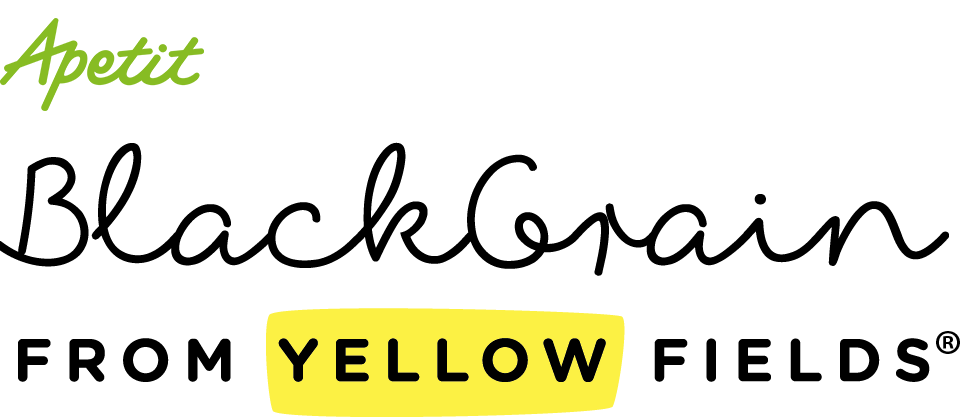Introducing the sustainable upcycled BlackGrain rapeseed ingredients and investing in renewable energy, Apetit has taken big steps towards an ever more sustainable food production process. By acknowledging the environmental impact of cultivation, it now has its next steps in sight. Apetit’s Communication and Sustainability Manager Miika Kemilä expands on the BlackGrain from Yellow Fields® point of view.
Setting sights for more sustainable cultivation
Apetit’s current climate goals are set until 2025 but the group is already looking further. When it comes to the production process, so far, the group has focused on the emissions directly related to its energy use. Through determined efforts, Apetit’s Kantvik oil milling plant now gets more than 80 percent of its energy from renewable sources.
“According to our studies, the majority of the carbon footprint of rapeseed oil stems from its cultivation. Developing cooperation with primary production to curb and lower its environmental impact is an important matter for us”, states Communication and Sustainability Manager Miika Kemilä.
Read more about the BlackGrain from Yellow Fields® approach to responsible food production
Improved crop cultivation and value chain management are driven with determination
To achieve its goals, Apetit is seeking to develop cultivation practices in Finnish fields to unleash the significant potential of increasing crop yields. However, changing agricultural practices and introducing new crop varieties require long-term efforts to observe and measure any potential positive environmental impacts. This requires a lot of patience from the research community.
“Just measuring the impacts requires several years of data. Our environmental impact assessments are highly influenced by the yearly crop yield per hectare. Any weather fluctuations can significantly affect the yields and thereby the numbers. This is why it’s important to study data from multiple years”, Kemilä explains.
The increasing interest in corporate responsibility also heightens expectations for effective supply and value chain management. Farmers see these expectations as a growing demand for data. Numerous farmers must meet both environmental and social responsibility standards. Reporting, auditing, and compliance with agricultural legislation serve as tools.
“As Apetit and thus BlackGrain from Yellow Fields® are firmly embedded in our value chain, we want to work on this issue together with farmers. We are situated closely, and the raw material for BlackGrain rapeseed ingredients is partly domestic. However, considering the substantial number of suppliers and the volume of raw material, we still have work to do”, says Kemilä.
Rapeseed is a sustainable choice
Despite the challenges, rapeseed is seen as a sustainable choice, offering benefits such as pollinator attraction – a matter that has more significance the more closely the importance of pollinators for the whole ecosystem is examined.
“Oilseed plants also make sense as they are great for crop rotation and their cultivation can be scaled up for domestic sourcing. While approximately a quarter of the raw rapeseed material for BlackGrain rapeseed ingredients is sourced from Finland and the rest from Baltic countries, efforts are underway to boost domestic oil crop cultivation. Additionally, as plant-based food, oilseed products are a good source of nutrition from a climate point of view”, Kemilä notes.
Encouraging co-operation in sustainable cultivation
In June 2023, the RypsiRapsi forum was launched in Finland, a platform that brings together farmers, research operators, input producers, and processors – essentially the whole domestic oilseed sector.
“Apetit has been the driving force behind the forum, and its activities are co-ordinated by the Pyhäjärvi Institute, an expert organisation that plans and implements development, research, and further education projects in the food industry, water protection, and the bioeconomy”, enlightens Kemilä.
“With an open forum for the whole Finnish oil seed sector, we want to bring together everything that has already been done, but also to get the whole sector to develop the cultivation of oilseed plants together. The main goal is to increase the farming area of rapeseed and to increase the yields. It is important, that farmers are part of RypsiRapsi forum.”
From the BlackGrain from Yellow Fields® point of view, this is a natural continuation of Apetit’s own evolution.
“We have a lot of experience in working with primary production. Additionally, our experience in product development spans decades. This means that we are deeply involved in developmental work spanning from the field to the end products. To me, that is one of the greatest aspects of the culture in this company,” Kemilä rejoices.
Eager to learn more? Find answers to our most frequently asked questions!


